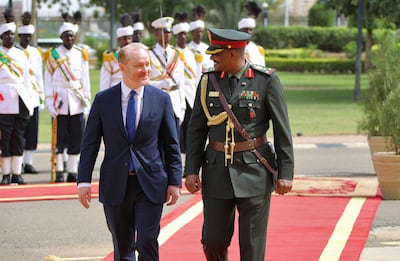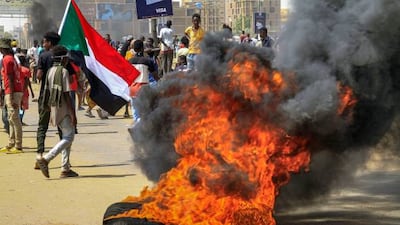Sudan's protest movement has come to a stalemate with the country's military rulers, analysts say.
While the generals have failed to avert the country's slide into economic ruin, the grassroots protest movement has been unable to reach a critical mass and topple them.
For now, the crisis has slipped from international headlines after a lull in violence, in part due to heavy floods in many parts of the country. But the killings continue.
Waleed Salah, 21, from Khartoum, died last week when a tear-gas canister hit him on the head during a street protest calling for an end to military rule.
He became the 117th person to die in an anti-military protest since army chief Gen Abdel Fattah Al Burhan seized power last October, derailing Sudan’s fragile transition to democratic rule and plunging the Afro-Arab nation into a political and economic crisis.
Salah’s death, the first of a protester in more than a month, may not be remembered as a milestone or a defining point in Sudan’s struggle for democracy.
However, it has served as a grim reminder to an outside world largely preoccupied by the Russia-Ukraine war that opposition to the rule of the generals in the vast Afro-Arab nation has not died.
With the first anniversary of the army's takeover less than two months away, neither side in Sudan’s deadly rivalry between the military and the civilian pro-democracy movement is closer to triumphing over the other.
The military on the one hand appears unable, or unwilling, to move the country forward on the path towards democratic elections and the opposition appears hamstrung by its divisions.

But it is the military that looks least likely to prevail, having failed to deal with the major crises tearing Sudan apart since their October 25 power grab, from a rapidly worsening economic and security situation, to deadly floods and restoring peace in remote parts of the country.
“Both sides have used up much of their resources,” said Sudanese political analyst Amar Awad. “There’s a balance of weakness now that could perhaps lead to a political settlement. It will not come any time soon, but it will come in the end.”
The gap between the two sides has been seemingly unbridgeable, with neither side agreeing to make meaningful concessions to launch a new bid for a settlement after the UN failed to do so earlier this year.
Gen Al Burhan has tirelessly stuck to a narrative that he is acting to pull the country back from the abyss, but in reality the army takeover plunged Sudan into what is perhaps its worst economic crisis since independence in 1956.
The military has failed to form the government of technocrats it said would run the country until elections are held. Neither has it succeeded in creating entities needed to draft a new constitution or organise the elections it promised for 2024.
Ethnic tensions resurface
The fragile security in the country’s western and southern regions has been shattered, with ethnic and tribal violence claiming hundreds of lives in recent months and uprooting tens of thousands.
The opposition, for its part, has shown grit and resolve in engineering a wave of peaceful protests against the generals, sending millions out on the streets to voice their demands for the military to step down and quit politics and for the generals to be held accountable for the killing of protesters.
However, there have been fewer street protests in recent weeks, giving the impression of a movement running out of steam. The various pro-democracy groups have failed to create a single alliance that will work more effectively to topple military rule.
“We and others are regrouping,” said Erwah Al Sadeq of the Forces of Freedom and Change, or FFC, the pro-democracy opposition alliance that until the army's October takeover had partnered the military in a transitional administration formed after Omar Al Bashir’s was ousted in April 2019.
“We are also far along in producing a manifesto or a constitutional declaration that will hopefully win the support of everyone in the opposition.”
He and other activists claim that this year’s unusually heavy rainy season — July to September — and subsequent flooding are to blame for a reduction in the number of protests.

“The regime’s arrest of protesters and the systematic violence against them have also meant that fewer people are willing to risk participation in street rallies,” said Mr Al Sadeq. “Moreover, staging rallies is not just about sending people out on the streets. It costs money, and money is running out.”
Another Sudanese analyst, Mohammed Abdel Aziz, claims that burgeoning divisions between the military and its allies are likely to boil over into open conflict that would weaken the regime and increase its chances of collapse.
He said an alliance between the military, the paramilitary Rapid Support Forces and their Islamist supporters was unlikely to endure for long given their ideological differences.
Already, RSF commander Mohamed Hamdan Dagalo — also Gen Al Burhan’s deputy on the ruling, military-led Sovereignty Council — has said that the October coup has failed to achieve its declared goals.
His comments to the BBC fuelled speculation that he and Gen Al Burhan may be at odds.
“The regime’s three factions have their differences, mostly over tactics, and they are likely to boil over and maybe lead to the collapse of the regime,” said Mr Abdel Aziz.
The West, led by the US, appears to stand firmly by the opposition, but appears unable to exert enough pressure on the military to step down despite the suspension of billions of dollars’ worth of economic aid and debt forgiveness.

In a clear snub to the military, and an implicit call on the generals to step down, new US ambassador to Sudan John Godfrey tweeted after he presented his credentials to Gen Al Burhan last week that he looked forward to “strengthening the US relationship with the Sudanese people, supporting their desire to advance their country’s democratic transition under civilian leadership”.
He later paid tribute to the protesters killed by security forces over the past 10 months after he met the mothers of four “martyrs who tragically lost their lives while demonstrating in support of freedom and democracy in Sudan”.
“I was moved by their message that their children’s lives cannot have been lost in vain and civilian-led government must be restored,” he said.


